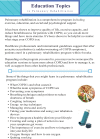Improving acceptance and uptake of pulmonary rehabilitation after acute exacerbation of COPD: Acceptability, feasibility, and safety of a PR "taster" session delivered before hospital discharge
- PMID: 31505942
- PMCID: PMC6737870
- DOI: 10.1177/1479973119872517
Improving acceptance and uptake of pulmonary rehabilitation after acute exacerbation of COPD: Acceptability, feasibility, and safety of a PR "taster" session delivered before hospital discharge
Abstract
The objectives of this study were to (1) assess the acceptability, feasibility, and safety of delivering a pulmonary rehabilitation (PR) "taster" session to patients hospitalized with acute exacerbations of chronic obstructive pulmonary disease; (2) evaluate the changes in patient knowledge and readiness to commence PR; and (3) make recommendations for future intervention iterations. Acceptability was measured by the proportion of patients that accepted to participate. Feasibility was measured by the proportion of eligible participants. Knowledge was evaluated using the modified versions of the Understanding COPD (UCOPD) and Bristol COPD Knowledge (BCKQ) questionnaires. Readiness to commence PR was measured by a modified version of the Readiness to Change Exercise Questionnaire. All measures were delivered pre- and post-intervention. Thirty-one of 34 eligible individuals were able to be approached. Prospective acceptability was low, with 24 individuals declining the intervention, 1 being discharged without making a decision, and only 6 participating. Positive median change was recorded in the modified UCOPD questionnaire (+8), but not the BCKQ (0). Three of the patients were already in the action phase pre-intervention, with all but one in that phase post-intervention. The delivery of a PR "taster" session was not prospectively acceptable to a large portion of patients and only feasible with modifications to the original protocol.
Keywords: COPD; acute exacerbation; pulmonary rehabilitation.
Conflict of interest statement
Similar articles
-
Web-Based Self-management Program (SPACE for COPD) for Individuals Hospitalized With an Acute Exacerbation of Chronic Obstructive Pulmonary Disease: Nonrandomized Feasibility Trial of Acceptability.JMIR Mhealth Uhealth. 2021 Jun 11;9(6):e21728. doi: 10.2196/21728. JMIR Mhealth Uhealth. 2021. PMID: 34114960 Free PMC article.
-
Is inspiratory muscle training (IMT) an acceptable treatment option for people with chronic obstructive pulmonary disease (COPD) who have declined pulmonary rehabilitation (PR) and can IMT enhance PR uptake? A single-group prepost feasibility study in a home-based setting.BMJ Open. 2019 Aug 8;9(8):e028507. doi: 10.1136/bmjopen-2018-028507. BMJ Open. 2019. PMID: 31399454 Free PMC article.
-
Evaluation of multidisciplinary pulmonary rehabilitation education delivered by either DVD or spoken talk.Clin Respir J. 2018 Nov;12(11):2546-2550. doi: 10.1111/crj.12954. Epub 2018 Sep 25. Clin Respir J. 2018. PMID: 30221825
-
Active mind-body movement therapies as an adjunct to or in comparison with pulmonary rehabilitation for people with chronic obstructive pulmonary disease.Cochrane Database Syst Rev. 2018 Oct 10;10(10):CD012290. doi: 10.1002/14651858.CD012290.pub2. Cochrane Database Syst Rev. 2018. PMID: 30306545 Free PMC article.
-
Rehabilitation in chronic respiratory diseases: In-hospital and post-exacerbation pulmonary rehabilitation.Respirology. 2019 Sep;24(9):889-898. doi: 10.1111/resp.13516. Epub 2019 Mar 5. Respirology. 2019. PMID: 30835884 Review.
Cited by
-
Early home-based pulmonary rehabilitation following acute exacerbation of COPD: A feasibility study using an action research approach.Chron Respir Dis. 2020 Jan-Dec;17:1479973120949207. doi: 10.1177/1479973120949207. Chron Respir Dis. 2020. PMID: 32815732 Free PMC article.
-
Innovative strategies to improve the reach and engagement in pulmonary rehabilitation.J Thorac Dis. 2019 Oct;11(Suppl 17):S2192-S2199. doi: 10.21037/jtd.2019.10.29. J Thorac Dis. 2019. PMID: 31737346 Free PMC article. Review.
-
Chronic Obstructive Pulmonary Disease Patients' Acceptance in E-Health Clinical Trials.Int J Environ Res Public Health. 2021 May 14;18(10):5230. doi: 10.3390/ijerph18105230. Int J Environ Res Public Health. 2021. PMID: 34069028 Free PMC article. Review.
-
The Influence of COPD Awareness on Hospital Admissions: A Paradoxical Relationship?Healthcare (Basel). 2025 Jun 16;13(12):1438. doi: 10.3390/healthcare13121438. Healthcare (Basel). 2025. PMID: 40565465 Free PMC article.
-
Lung Flare Care: Development of a web resource to improve recovery after COPD exacerbations: A mixed methods study.PLoS One. 2025 May 22;20(5):e0324468. doi: 10.1371/journal.pone.0324468. eCollection 2025. PLoS One. 2025. PMID: 40403038 Free PMC article.
References
-
- Jones PW, Chen WH, Wilcox TK, et al. Characterizing and quantifying the symptomatic features of COPD exacerbations. Chest 2011; 139(6): 1388–1394. - PubMed
-
- Kessler R, Stahl E, Vogelmeier C, et al. Patient understanding, detection, and experience of COPD exacerbations: an observational, interview-based study. Chest 2006; 130(1): 133–142. - PubMed
-
- Miravitlles M, Anzueto A, Legnani D, et al. Patient’s perception of exacerbations of COPD—the PERCEIVE study. Respir Med 2007; 101(3): 453–460. - PubMed
-
- Pitta F, Troosters T, Probst VS, et al. Physical activity and hospitalization for exacerbation of COPD. Chest 2006; 129(3): 536–544. - PubMed
MeSH terms
LinkOut - more resources
Full Text Sources
Medical
Research Materials



